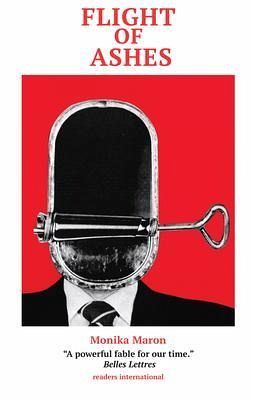
Flight of Ashes (eBook, ePUB)
Versandkostenfrei!
Sofort per Download lieferbar
6,99 €
inkl. MwSt.
Weitere Ausgaben:

PAYBACK Punkte
3 °P sammeln!
MONIKA MARON, today one of Germany's greatest living writers, created Flight of Ashes and the wonderfully feisty Josepha Nadler when she herself was struggling to leave East Germany, a struggle that involved her élite communist family, the STASI, her future career, and her own conscience.The young journalist's visit to the filthy industrial town of B¿-¿Bitterfeld in the center of the GDR¿-¿challenges her moral and political assumptions and plunges her into the personal and professional battle of her life.Today our horror at pollution is widespread, but in some of our own democratic societ...
MONIKA MARON, today one of Germany's greatest living writers, created Flight of Ashes and the wonderfully feisty Josepha Nadler when she herself was struggling to leave East Germany, a struggle that involved her élite communist family, the STASI, her future career, and her own conscience.
The young journalist's visit to the filthy industrial town of B¿-¿Bitterfeld in the center of the GDR¿-¿challenges her moral and political assumptions and plunges her into the personal and professional battle of her life.
Today our horror at pollution is widespread, but in some of our own democratic societies and stripped of the old communist rhetoric, we are still asked like Josepha to look away, ignore the facts and the flue ash - keep quiet and keep smiling.
From the review in PUBLISHERS' WEEKLY:
"A poignant tale of a woman's battle to be herself¿
-¿impatient, honest, emotional and a dreamer like her peasant grandfather¿-¿
in a society where people think and move like robots."
The young journalist's visit to the filthy industrial town of B¿-¿Bitterfeld in the center of the GDR¿-¿challenges her moral and political assumptions and plunges her into the personal and professional battle of her life.
Today our horror at pollution is widespread, but in some of our own democratic societies and stripped of the old communist rhetoric, we are still asked like Josepha to look away, ignore the facts and the flue ash - keep quiet and keep smiling.
From the review in PUBLISHERS' WEEKLY:
"A poignant tale of a woman's battle to be herself¿
-¿impatient, honest, emotional and a dreamer like her peasant grandfather¿-¿
in a society where people think and move like robots."
Dieser Download kann aus rechtlichen Gründen nur mit Rechnungsadresse in A, D ausgeliefert werden.













